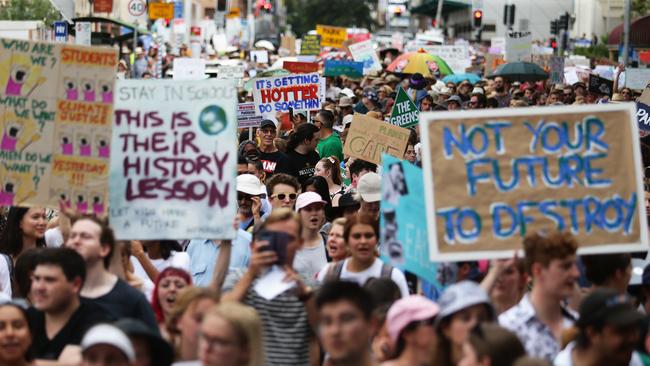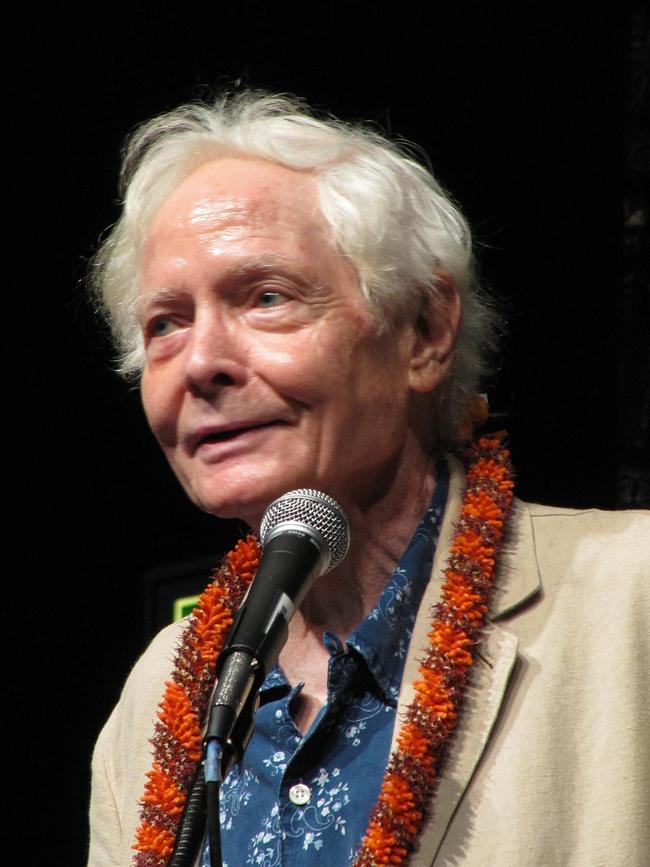Kathleen Noonan reflects on the wonder of ‘late happiness’
Have you discovered late happiness, readers? An unexpected period of contentment and joy after decades of wanting, seeking, regrets, too much restlessness.

QWeekend
Don't miss out on the headlines from QWeekend. Followed categories will be added to My News.
There is a storm circling, rain just started and ferns reaching up, almost grabbing the droplets with greedy green fists before they hit the ground. A storm after a long dry does that.
I am inside. I have tea. I have scones. And I have William Merwin. (Firstly, a little something about scones. A simple, well-executed scone, with tart raspberry jam and cream, is nine times out of 10 better than any extravagant over-the-top thing. Thrown together in five minutes, just out of oven, little crusty outside. Not too rich, too sweet, too much.)
Secondly, something about W. S. Merwin.
This American poet, with more than 50 books of poetry, translation and prose, influenced by Buddhist philosophy and deep ecology, was never too rich, too sweet, too much.
Made US poet laureate in 2010, he received virtually every distinction a poet could aspire to, including two Pulitzer Prizes.

He sustained this long career with love and gardening. On the Hawaiian island of Maui, in the 1980s, Merwin found a run-down pineapple plantation and with his wife, Paula, worked to restore the rainforest.
Noah Adams, of NPR’s All Things Considered, wrote: “His day would begin early with tea, the birds, the wind, maybe some poetry … The afternoon was given to bringing back the palm trees.”
The land was transformed from degraded to one of the world’s most comprehensive palm forests, a future sanctuary called the Merwin Conservancy. So, he was not just a pen-pusher.
When news broke this month of Merwin’s death, in his sleep at home in Hawaii, aged 91, I searched the bookshelves to read again his poem December Morning for that opening line: “How did I come to this late happiness?” He goes on: “I know it is rash to speak about happiness / with the Fates so near that I can hear them / but this morning even the old regrets / seem to have lost their rancour / and to harbour shy hopes … ”
Have you discovered late happiness, readers?
An unexpected period of contentment and joy after decades of wanting, seeking, regrets, too much restlessness.
Merwin tells us late happiness is possible. People can endure tough childhood circumstances, harrowing marriage breakups, challenging health issues, and still find late happiness.

George Saunders, who won the 2017 Man Booker for his inventive novel Lincoln in the Bardo, links late happiness with kindness: “As we get older, we come to see how useless it is to be selfish – how illogical, really. We come to love other people … We get our butts kicked by real life and people come to our defence and help us and we learn that we’re not separate and we don’t want to be.”
He told Radio National recently that he regrets most in life his “failures of kindness”. “I just turned 60 … and am kind of revelling in the sense that as I get older, life does seem simple. I have no doubt what we are here to do: be more loving.”
A retired airline pilot I met a while ago, who seemed to have a golden life, said: “I spent a lot of years measuring myself against others. Wildly envious. Having the right house, the right kids, the right wife. Christ, I wish I was as content then as I am now. What a bloody waste of all those years.”
Merwin talked about never relying on money for his happiness.
When he told people he wanted to be a poet, they said, that’s not enough to make a living. He would respond: “What do you call a living? I don’t want any more than I need.”
The storm’s energy has now dissolved into heavy rain as I read December Morning: “I am almost blind and I see the piles / of books I was going to read next / there they wait like statues of sitting dogs / faithful to someone they used to know”.
Having read that line, can you ever forget that image?
So there we have an old man, almost blind, writing about late happiness, despite everything. What can we learn from these elders, as they go before us? Who knows?
Maybe we have to learn it all for ourselves, the hard way, like the pilot. I’ve a theory. Maybe it’s the garden, the growing of things, being part of the planet that gave Merwin a conduit to joy.
As he wrote in the poem Place: “On the last day of the world / I would want to plant a tree”.

AND ANOTHER THING …
How delicious that just by doing what many generations have done before them – a little peaceful protesting – thousands of Australian students skipping school calling for an end to climate change inertia can get so many politicians and commentators all het up.
Let them demonstrate on Saturday, the critics said, revealing how much they missed the point of the concept of a “strike”.
Dave Eggers, writer, publisher and humanitarian campaigner, recently spoke about high-school activism in the US.
“The thing I love about high-school idealists,” he told The Guardian, “is they are largely free of self-doubt and overthinking. They see a wrong and they go at it.”
He believes adults – even university students – too often equivocate and drown themselves in process and procedure over results.
“After Parkland [school shooting, February 2018], those high schoolers had the courage and moral clarity that most politicians in the US haven’t had with regard to guns. They earned the right to lead us on that issue, and they should, too, lead us on so many issues, like climate change, that will affect them more than any other demographic. We are borrowing this world, so they should be able to set a framework for the use of this planet until they inherit it.”
noonanslastword@gmail.com


